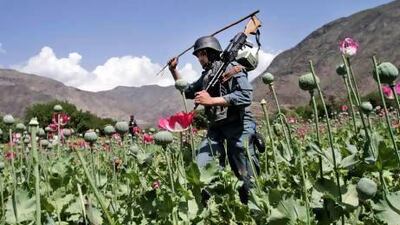KABUL // Opium poppy cultivation in Afghanistan had increased for a third year in a row and was heading for a record high, the United Nations said yesterday.
The boom in poppy cultivation was at its most pronounced in the Taliban's heartland in the south, the report showed, especially in regions where troops of the US-led coalition had been withdrawn or were in the process of departing. The report suggested that whatever international efforts had been made to wean local farmers off the crop, they had enjoyed little success.
Increased production is being driven by unusually high opium prices, but more cultivation of Afghanistan's premier cash crop is also an indication that Afghans are turning to illicit markets and crops as the real economy shrinks ahead of the expected withdrawal of foreign combat troops next year
Afghanistan is the world's largest producer of opium, the raw ingredient in heroin, and last year provided about 75 per cent of the global crop - a figure that could jump to 90 per cent this year due to increased cultivation.
Crop sales mostly fund local power brokers and criminal gangs in Afghanistan and to a lesser degree the Taliban, western experts believe. This makes it difficult for the Afghan government to establish control in areas where the economy is driven by black-market opium sales, despite a small but effective counternarcotics force.
"As we have predicted, opium will go up for a third year in a row," said Jean-Luc Lemahieu, head of the UN Office on Drugs and Crime in Afghanistan, which prepared the report along with the Afghan Counternarcotics Ministry. "We are looking at a record high cultivation."
The Afghanistan Opium Winter Risk Assessment 2013, issued by the United Nations Office on Drugs and Crime, was conducted in two phases. One from December to January for central, east, south and west Afghanistan, where opium was sown in the autumn last year, and another in February and March that covered north and north-east Afghanistan, where opium is usually planted in the spring.
The exact figure for the year was still unclear, but the UN said that indications suggested it would surpass the 154,000 hectares planted last year and the 131,000 in 2011.
The report attributed the increase to the high sales price of opium, which has made cultivation attractive to farmers. Although prices were lower than the three previous years they "were still at a higher level than between 2005 and 2009, making opium cultivation very attractive to farmers". Fear of eradication was the main reason cited by those farmers who decided not to cultivate the crop.
Prices started climbing in 2010, when blight killed much of the crop. They went from about US$60 to $85 (Dh220 toDh312) a kilogram to $300 in 2011. Although prices this year range from $160 to $200, they are still very high.
"This price is not explainable," Mr Lemahieu said. "There is no demand increase to explain this."
Afghan heroin makes its way to regional countries, Europe and Russia.
"Afghanistan [will] turn into a narcostate unless ... there is a comprehensive strategy that is adopted now," said UNODC deputy representative Ashita Mittal. "Time is not on our side."
The report found that poppy cultivation trends indicated that, of Afghanistan's 34 provinces, an increase was predicted in 12, no major change in seven and a decrease in one; 14 were expected to remain poppy free.
Two of the provinces, southern Kandahar and Helmand, expected high and very high cultivation levels. They are the two provinces where the US-led coalition is withdrawing troops. They were also two of the provinces where great emphasis was placed on finding alternative crops for farmers.
"The southern region is expected to remain the largest opium cultivating region in Afghanistan in 2013. Poppy cultivation in Helmand and Kandahar, the main opium-cultivating provinces in the country, is expected to increase and Helmand is expected to retain its status as the largest opium cultivating province in the country," the report said.
In Helmand province, the head of the Afghan counternarcotics police, Mohammad Abdali, said his forces were operating in areas controlled by the Taliban in an effort to eradicate poppy.
"This is an area where the Taliban told people that they can cultivate poppy and the government can't destroy it," he said on Sunday. "They escaped and we are destroying all poppy in the area."
But in Bawri, a village only 30 kilometres away, farmers could be seen in their fields that day harvesting opium poppy, making no apparent effort to disguise what they were doing.
Illicit cultivation and production of opium poppy was thought to make up about 15 per cent of Afghanistan's gross domestic product, which last year stood at about $20 billion. It is unclear what percentage it will be this year.
Much of Afghanistan's GDP is funded by foreign investment and the country's real economy is expected to shrink after next year, when foreign troops leave the country and international investment in the country drops.

